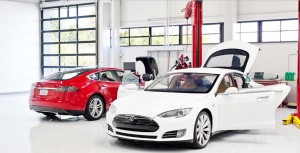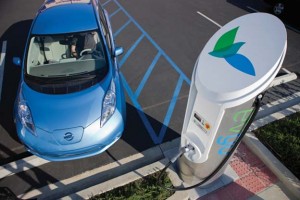
Battery cars - like the Tesla Model S - could meet the needs of millions of motorists, claims a new survey.
They may not be ready to buy one, but Americans, on the whole have a positive view of electric vehicles, according to a new survey.
The survey, conducted by the Union of Concerned Scientists, found that 65% of the American motorists it polled think electric vehicles are an essential part of our nation’s transportation future for reducing oil use and global warming, with 60% saying they would consider owning one themselves.
More than 45 million Americans could use a battery-based vehicle without much change in their driving habits, according to the Union, which has long advocated for the wider use of EVs.
“Drivers may have preconceptions about whether electric vehicles can meet their driving needs and habits, and this survey shows that for many, they can,” said Josh Goldman, policy analyst for the UCS Clean Vehicles Program.
While plug-in hybrids have similar driving range to gasoline-only vehicles, the current, limited range of pure battery-electric vehicles, or BEVs, can still meet many drivers’ needs, Goldman said. The survey found that almost 70% of motorists drive less than 60 miles on a weekday, which is within the range of almost every BEV on the market today.
“This new survey shows today’s EVs can be practical for many car buyers,” said Shannon Baker-Branstetter, the policy counsel for Consumers Union. “It demonstrates that these vehicles could be a viable option for tens of millions of American households that want lower fuel costs and cleaner air without compromising their driving needs.”
(Price, not range, a major obstacle to EV acceptance, warns another study. Click Here to see more.)
Tens of thousands of battery electric vehicles have been sold in the U.S., primarily in California. But the vast majority of American motorists remain skeptical about the technology and manufacturers have been reluctant to step up production to fill the tiny, though growing, market niche.
But due to California’s tough Zero-Emissions Vehicle mandate, all major manufacturers will soon have to offer at least one battery – or hydrogen-powered – vehicle in their fleet if they continue to want to sell vehicles in the Golden State.
(Click Here to see if hydrogen power could be a more viable alternative to batteries.)
Switching to EVs could save up to15 billion gallons of gasoline every year, which is equal to all of the gasoline consumed by the entire state of California, claimed the UCS. The switch would stop 89 million metric tons of greenhouse gas emissions each year, which is the equivalent to removing 14 million of today’s gasoline cars from the road an entire year.
Americans also would save $33 billion spent on motor fuel each year – based on gas prices of $3.60 per gallon and electricity costs of 12 cents per kilowatt hour – the organization estimated.
While the survey results are likely to generate some debate, Union officials claimed it shows that millions of households could utilize an EV today, and that the figure could grow in the future.
The survey did reveal some potential infrastructure-based problems that could limit the growth of the EV market, however. It found that 33% of the respondents did not have access to parking with an electrical outlet, even if they met the other basic criteria for owning a plug-in hybrid electric vehicle.
But more than a third, 37%, said that having access to charging at the workplace would increase the likelihood of their considering an EV in their next vehicle purchase.
The findings suggest, while incentives that lower the cost of purchasing an electric vehicle will continue to play a key role in expanding the demand for EVs, efforts to increase access to vehicle charging options at home and the workplace also can help make EVs a more reasonable choice for potential buyers.
“There is a huge potential to continue expanding the market for electric vehicles, a key solution for tackling climate change and cutting our nation’s projected oil use in half over the next 20 years,” said David Reichmuth, senior engineer for the UCS Clean Vehicles Program. “Americans recognize that we need to reduce our oil use, and electric vehicles offer a great opportunity for drivers to do just that.”
(Nissan Leaf owner “steals” electricity, gets jail time. Click Here for the story.)


When the masses vote for EVs with their wallet, then we’ll know that they actually like them and are not just being PC.